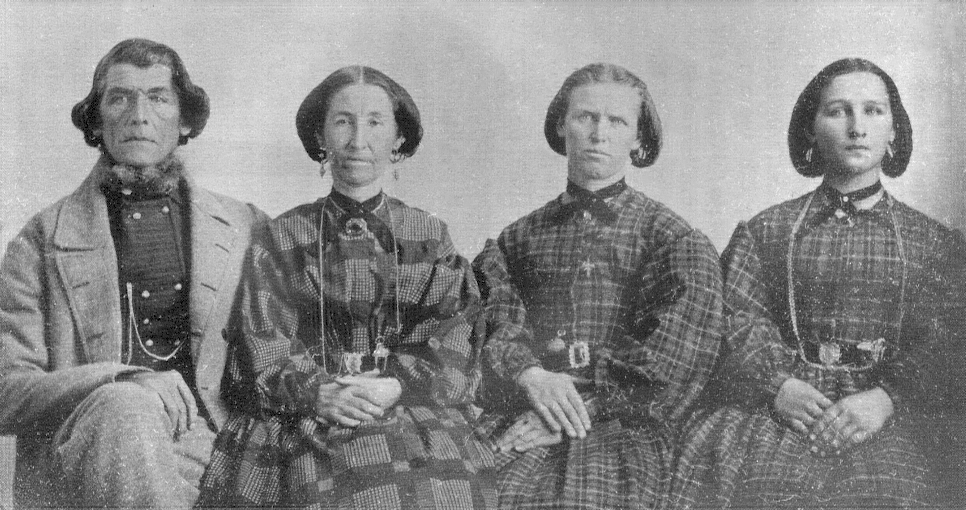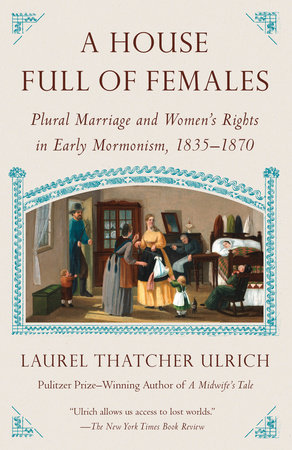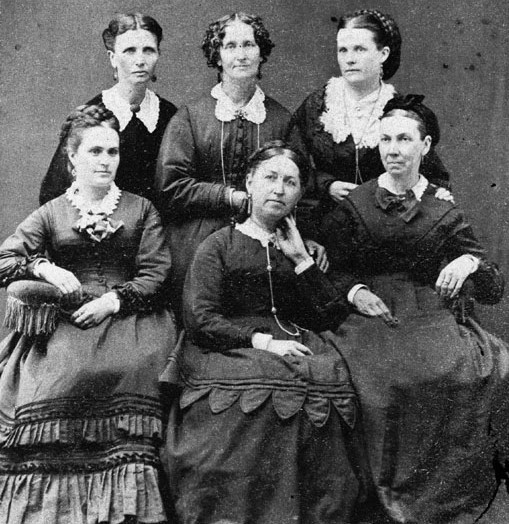February 7, 2022 (Season 4, Episode 4: 67 minutes long), click here for the BuzzSprout version of this Speak Your Piece episode. The above photograph is of (beginning top left) Emmeline B. Wells, Mrs. Goddard, Mary Musser, Maggie Mitchell, Rachel Grant and Bathsheba W. Smith; Salt Lake City 13th Ward Relief Society group; mid-1870s; Charles W. Carter, photographer. Courtesy of the Utah State Historical Society.
American historian Laurel Thatcher Ulrich’s influential 2017 book A House Full of Females: Plural Marriage and Women’s Rights in Early Mormonism,1835-1870 (Vintage Books, New York), is the focus of this part-conversation, part seminar discussion, between pubic historians Dr. Cassandra Clark and Brad Westwood. The purposes for this discussion: (a) offer an exchange of ideas regarding Ulrich’s book; (b) highlight the author’s thesis and arguments or at least a selection of Ulrich’s arguments; and (c) draw out important through-lines not often understood by the general public concerning 19th century Mormon women’s history. All of this to understand better Utah’s history.
This is the first episode in a series on Utah women’s history where the Utah Division of State History’s public historian Dr. Cassandra Clark, discusses important books and articles on Women’s history in Utah.
PODCAST EPISODE:
Topics discussed in this episode include: Clark’s take on Ulrich’s thesis and arguments; 19th century Mormon/Utah womens’ medical activities–how spiritual, medical and healing knowledge were largely treated together; a more complex story regarding the Mormon priesthood (women’s actors included); women laying the foundation for their church’s global successes; how women’s activities and networks supported proselytizing; how plural households and extended communities of women functioned as incubators for female activism (religious and political); and how the Utah-Mormon woman’s story fits into the larger 19th c. American story.

Topics discussed, continued: How and why Mormon women worked differently within separate gender spheres; womens’ writing, editing and publishing; how Utah women’s large “Indignation Meetings” (1870s to 1890s) offered public support of plural marriage and attempted to defend the practice against broad national anti-polgyamy sentiments; why and how Utah women were prepared to interact in a broader American Suffrage Movement; how the future of Utah’s history requires uncovering or discovering women’s voices from traditional and non-traditional records (correspondence, diaries, artifacts and more); a more accurate story regarding the mid-1860s official return of the Female Relief Society organization; and finally, how Ulrich’s book encourages historians to uncover more about the broader Utah women’s experience beyond Mormonism.
Pulitzer prize winning Dr. Laurel Thatcher Ulrich (Harvard University) specializes in early American history and history of women. In the 1970s Ulrich coined the oft quoted line “Well-behaved women seldom make history.” To read more about Laurel’s life and work, see the American Historical Association Laurel Thatcher Ulrich Biography.

Dr. Cassandra Clark (University of Utah, 2020) has been since November 2021, a public historian and coordinator for the State of Utah’s Women’s History Initiative. Her email address is: cassandraclark@utah.gov.
To purchase a copy of A House Full of Females: Plural Marriage and Women’s Rights in Early Mormonism, 1835-1870 search on AbeBooks (for a used copy); or seek out your local independent book dealer here, to buy a new copy; or purchase a copy online from: Amazon.com. For a listing of other titles by Laurel Thatcher Ulrich click here.
OTHER SOURCES TO CONSULT:
- To listen to an interview with the author, we recommend that you listen to: Maxwell Institute, interview, Laurel Thatcher Ulrich, regarding A House Full of Females, Podcast #62
- Carol Smith-Rosenberg, “The Female World of Love and Ritual: Relations between Women in Nineteenth-Century America,” University of Chicago Press. This is a limited access link. Clark references this article in this episode.
Do you have a question or comment? Write us at “ask a historian” – askahistorian@utah.gov

